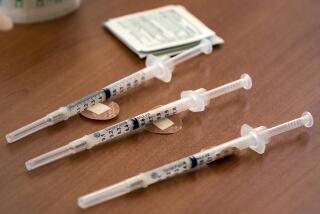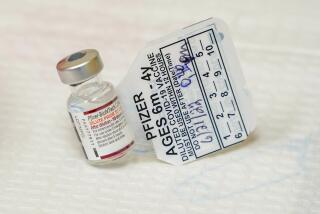Chickenpox Vaccines Effective, Costly
- Share via
The start of infant chickenpox vaccinations a decade ago has led to an 88% decline in hospitalizations and a 59% drop in doctor’s visits, according to a study published Wednesday in the Journal of the American Medical Assn.
Deaths have also dropped, from about 150 a year before the immunization program to an average of 66, according to recent statistics.
The study, by the national Centers for Disease Control and Prevention, also found that $63 million a year had been saved in medical expenses because hospitalizations were fewer.
But “the payoff of the vaccine program still remains far from clear,” said Dr. Matthew M. Davis of the University of Michigan in an editorial accompanying the study. The CDC estimates that vaccinating 4 million children a year costs $144 million.
Dr. Abigail Shefer, a CDC epidemiologist and coauthor of the study, acknowledged it was not a complete economic analysis. It omitted such potentially large costs as wages parents lost because they had to care for children.
The study, based on an analysis of 500 million private health insurance claim records, also did not address the costs incurred by those not covered by insurance.
Before the United States began the immunization program in 1995, chickenpox infected about 4 million Americans a year, most of them infants and toddlers. About 11,000 of them required hospitalization, according to the CDC.
Chickenpox causes a rash that first appears on the trunk and face, then spreads over the body, leaving hundreds of itchy blisters. The disease, which lasts five days on average, is uncomfortable but rarely fatal.
Once infected with chickenpox, which is caused by the varicella virus, a person is immune for life.
But the virus can hide in the body’s nervous system and reemerge later in life to produce shingles, a more severe condition.
A recent study has shown that vaccination of older people can prevent shingles.
The childhood vaccine tends to lose its protective power after several years. Thus, some parents choose not to have their children vaccinated out of fear that they will lose their immunity and contract chickenpox as adults.
The CDC is now recommending that students entering middle school, high school and college receive chicken pox booster shots to avoid the problem.
Many state health and school officials are debating the boosters because of questions over who will pay for them.






